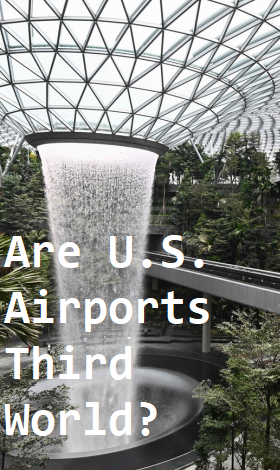
“…If I blindfolded you and took you to LaGuardia Airport in New York, you must think, ‘I must be in some third world country.’ I’m not joking,” Joe Biden said during a speech on infrastructure in 2014. Trump agrees. Daily News
LaGuardia is still hell (though it’s under improvement,) but in the last 30 days airports in Singapore and Turkey have been built bigger, better, and ever more beautiful, putting airports in the states to shame.
Just this week, an expansion of the Changi Singapore airport, named “Jewel,” opened to the world. It’s hard to define this expansion—Jewel is part transportation hub, part shopping mall, part destination garden. Jewel is an “urban center,” but contains over 235,000 square feet of landscaping, and a giant indoor waterfall. The 200 plant species in Jewel’s “Forest Valley” are under the same roof as 280 places to eat and shop. (This is in addition to the airport’s already existing 400.)
To experience Jewel you will have to enter into Singapore, which includes going through security. This might seem like a strange choice for an airport expansion, but it’s a purposeful one.
Singapore Changi Airport is one of the largest transport hubs in Southeast Asia, thanks to Singapore Airlines—both the airline and the airport are consistently rated “world’s best”—but people still aren’t visiting Singapore. It’s a pass through on the way to somewhere else. Singapore would like to change that—and get some international travelers to disgorge more of their cash.
The other latest and greatest airport of this year is the new Istanbul airport. Posters outside the airport say, “This is not just an airport. It’s a monument to victory.” Guardian
Like Singapore Airlines, Turkish Airlines is highly-rated (it’s considered the best in Europe). Turkish flies to more countries than any other airlines. Amazingly, they were able to move their entire fleet to the new airport in under 45 hours.
Costing around 12 billion to build, Istanbul Airport rushed to open on the 95th anniversary of the foundation of the Turkish Republic. This airport is controversial politically, and because of the many worker deaths during its construction.
But it’s not rare for airport projects to this scale to be steeped in controversy. Another reason why we don’t have airports like these in the states, is that U.S. airports are owned by cities or counties rather than by the federal government. In contrast, despots in Singapore and Turkey can more easily build their over-the-top airport vanity projects.
Which is why you see international airports building things like “Jewel” as a point of national pride, and don’t see this as much in the states. In Europe and Asia, travelers have options as to what airport they would like to fly through.
“If you think about London, Amsterdam, Dubai, Singapore or Hong Kong, they are all kind of hubs—not only domestic but international transit hubs,” says Thomas Sineau, an intelligence analyst with a focus on travel and luxury retail, “US airports aren’t international transit hubs as much as the others are. And because these other [international] airports are competing against each other [for passenger traffic], they really need to try attract airlines and passengers.” QZ
Istanbul airport is a grand airport—its tulip-shape control tower won first prize at the World Architectural Festival—and so is Changi Singapore. But can new airports, as gateways to countries, really attract more travel dollars? Singapore and Turkey are betting big bucks that they can.

 Save up to 60% on Business Class. Call 1-800-435-8776
Save up to 60% on Business Class. Call 1-800-435-8776
Turkiye is a third world country and moving an airport so fast is the peasant Erdogan’s way of cementing his dictatorship.